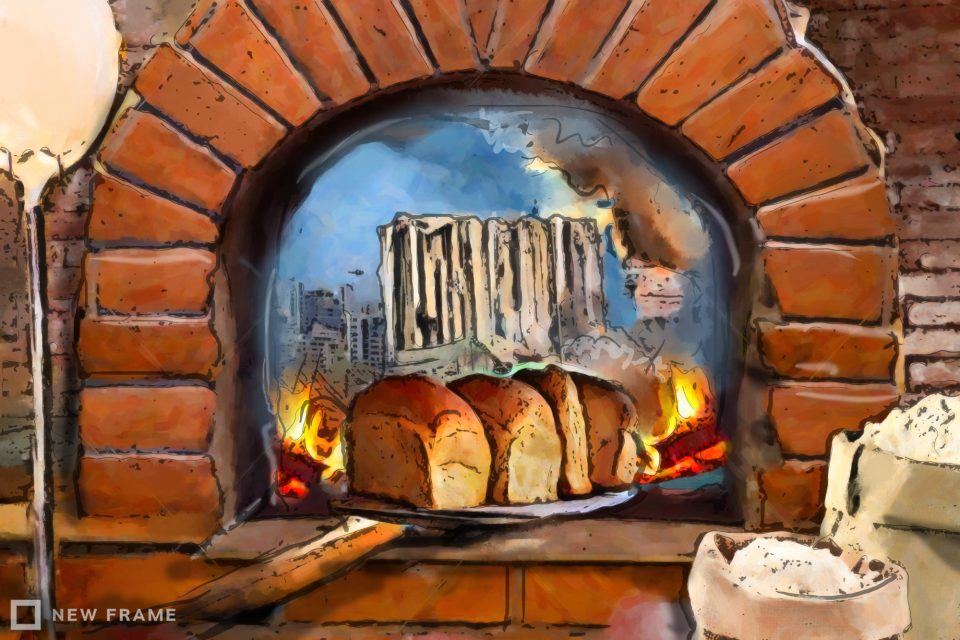Text Messages | Beirut, bread and the machine
Beirut’s grain silos have gone the way of The Greater Bread Company in Hassan Daoud’s novel, the former lost to an ammonium nitrate blast and the latter to mechanisation.
Author:
13 August 2020

For so basic a commodity, bread has a symbolic and metaphorical richness that few other foodstuffs can match. “I will take away from you your bread, which is your staff, and one oven shall suffice for 10 women to bake your bread; they shall dole this bread out by weight, and you shall eat and not be filled.” So says Yahweh in Leviticus, the third book of the Bible’s Old Testament, in stark warning to those who do not keep the laws of the Israelite religion.
It is from here that bread as the staff of life originates, a beautiful idea of support and succour without which it is impossible to live. This is the poetry of something that is also the stuff of life, at least in regions where wheat is grown or available. Leavened or unleavened, flat or puffy, soft and moist or hard and dry, bread reflects quirks of climate and national temperament, the literal and the lyrical, the edible and the literary.
When the massive grain silos at the port of Beirut, the capital of the Lebanon, were destroyed by 2 750 tonnes of ammonium nitrate detonating, the wheat supply and reserves of the nation went with them. In the instant that the blast’s terrible mushroom-shaped cloud rose over the port city, bread became more a luxury than a staple of the Lebanese diet.
Related article:
The further implosion of the fortunes of a country dealt the harshest of fates and weakest of hands by history, geography and sectarianism brought quickly to mind a novel by one of its best living writers. Hassan Daoud published Sanat al-Automatic in Arabic in 1996. Translated by Randa Jarrar, the English version appeared in 2007 under the splendid title The Year of the Revolutionary New Bread-Making Machine.
A career journalist and novelist, Daoud is the editor of Nawafez, the cultural section of Beirut daily newspaper al-Mustaqbal, as he was in 2007. What is fascinating about The Year of the Revolutionary New Bread-Making Machine is its portrait of the rambunctious seaside city that was Beirut in the 1960s. It is a place of life and loves, hates and schemes, and desires profound and pedestrian.
A grand endeavour
At the heart of the novel is the The Greater Bread Company, the bakery owned by the narrator’s father and so named, the reader is told, “to give the impression that the bakery was larger than it actually was, and that it never stopped baking, since its name looked like a long train, with smoke billowing out of it, like that which came from the oven itself.”
This is no mere bakery. Daoud has it stand in for tradition versus modernity, humanity versus machinery, the grace, dignity and difficulty of manual labour versus the brute force and ease of mass production. The aroma of baking bread wafts off these pages as the reader comes to know the team of bakers and their highly individualised tasks – dough-makers, dough-cutters, bakers – in the grand endeavour that is producing a loaf of bread. This is a complex picture of craft and grit and humanness, and a warning of what happens when the future is ceded to the dangerous promise of machines and those who punt them. In that, bread and its making are symbolic of Lebanon and its deep-rooted culture, faced suddenly by an abrupt turn to a future that is assumed to be better and easier for people.
Podcast:
That it is easier might be argued, but not that it is better. Contrast these three scenes.
“For my father, a baker was a baker, not what the government deemed he should be: his messy clothes reflected the messy business of manual labour. The bakery itself reflected this too, with its marble step worn thin from years of customers’ feet.”
“The three of them never left the stone table, unless Nawaaf the dough-maker wanted to stretch his legs after moving the 100-kilo bags of of flour and emptying them into the wide-lipped machine, or if Ghaleb the dough-cutter went to the bathroom after filling the table with unbaked loaves, or Hussein the shorty rubbed his palms together to remove the moist pieces of dough between his fingers.”
“He watched Nawaaf, the bakery’s last and only employee, running back and forth and raising his shoulders to hide his bare neck from my father’s palms. My father motioned for him to come – motioning had become his only form of communication – and Nawaaf wiped his hands clean of the dough that clung to them. Then he looked down at his clothes to make sure that they were clean and free of any trace of flour.”
The Greater Bread Company and its old methods have gone the way of the homogenised bread-making business, and the terrible loss is there for all to see and taste.


